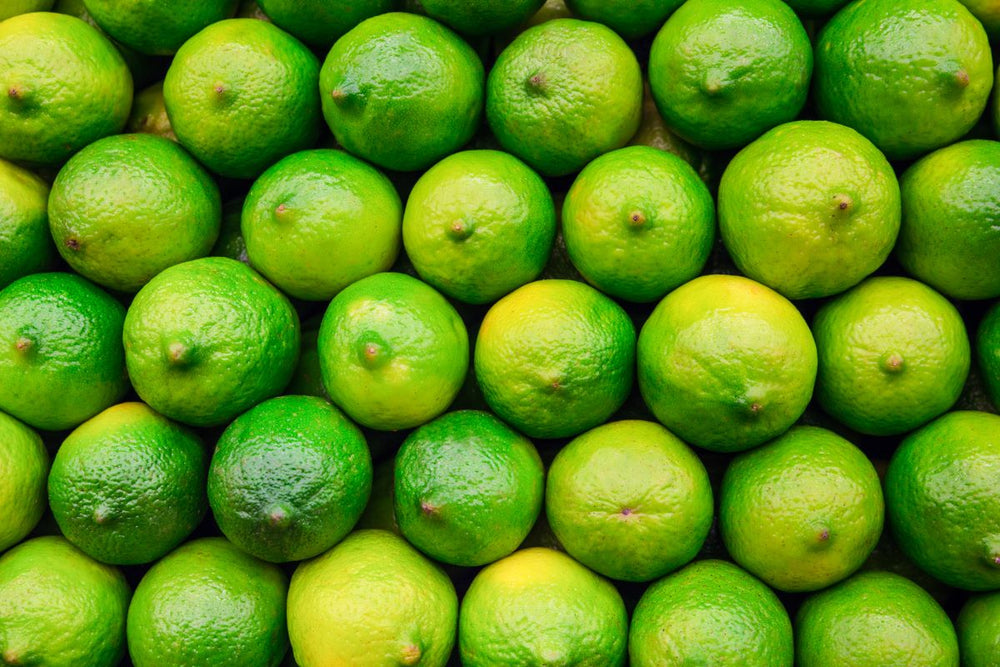By: Kayla Kowalski, Certified Canine Nutritionist
Limes are a favorite addition to many human food favorites, from cocktails to guacamole. We may enjoy a fresh squeeze of lime in our beverage or a sprinkle of zest to enhance our favorite recipes, but can dogs eat limes too?
While dogs can eat limes in minimal amounts, the sour taste is generally not appealing to pups. That said, if you have a lime tree in your backyard or are concerned about leaving limes out in the open, there are a few things you should know about this fruit.

Are Limes Bad for Dogs?
If your curious pup happens to sneak a lick or a bite, a small amount of lime juice is unlikely to cause much of an issue. However, the fruit isn't considered safe in high amounts.
Limes are high in citric acid and essential oils such as limonene and linalool. Their high acidity can disrupt the natural pH and lining of the gastrointestinal tract, resulting in gastrointestinal upset.
Limonene is a toxic compound found in lime peels and the peels of other sour citrus fruits, such as grapefruits, lemons, and oranges. When eaten in high enough amounts, the essential oil can cause damage to the liver and kidneys. Linalool, another essential oil found in the fruit, lowers blood pressure and can alter normal organ function.
Limes also contain phototoxic compounds known as psoralens. These increase your pup's skin sensitivity to light, making them more prone to sunburn (yes, dogs can get sunburned, too), rashes, and other skin irritations — ouch!
If your pup manages to eat a large amount of lime, the fruit can also be a choking hazard if swallowed without chewing.
Symptoms of Lime Poisoning
Signs of lime toxicity may include:
If your pup shows an unusual liking for limes and ingests a large amount or displays any of the above symptoms, please consult a veterinarian immediately.
What to Do if Your Dog Eats Lime
If your curious canine gets their paws on a lime, keep calm and watch them closely for 24 to 48 hours.
Offer bland food such as poached, skinless chicken breast, lean ground turkey, and steamed spinach. Also, consider adding foods high in fiber, like pumpkin, to soothe upset stomachs and get everything moving smoothly again.
Ensure fresh water is always accessible for your pup to keep their hydration up. Coconut water is excellent for hydration as well because of the electrolytes it contains; just make sure it has no added sugar.
Always contact your veterinarian if your dog has consumed a considerable amount of lime. They will assess the risk, depending on the part of the lime and the amount ingested, as well as your dog's breed and other health conditions.
Sweet Alternatives to This Sour Fruit
Limes are beneficial for human health as they contain antioxidants and vitamin C. When it comes to our fur babies, however, these nutrients can be provided through other fruits and vegetables or a good quality supplement.
So, if limes are off the table, what are some safe fruit alternatives?

Apples
Many dogs love apples as they are crunchy and juicy. As well as being a great tasty snack, apples are known to be a great source of antioxidants!
Just beware of leaving the seeds out, as these contain a compound called amygdalin, which releases cyanide when digested. Always cut the apple into bite-sized pieces before feeding it to your pup to avoid a choking hazard.
Bananas
Bananas are a great sweet and soft treat. They can be served to your dog sliced or mashed, fresh or frozen. Frozen bananas can be great on those hot summer days or blended with other dog-friendly foods, such as blueberries, spinach, xylitol-free yogurt, or peanut butter) and any supplements for a doggy smoothie.
It is vital to feed bananas in moderation to your dog as they are high in sugar, and often, just a few slices are enough. Unripe, green bananas provide prebiotics and are lower in sugar.
Blueberries
Blueberries contain antioxidants, vitamins, and minerals for a healthy treat or topper on their dog food. Alongside being great for them, most dogs love the bursting tangy flavors, and they are lower in sugar than many other fruits.
Blueberries also make a great addition to pup-friendly treats such as pupsicles and doggy ice cream.
The Bottom Line on Limes
While we enjoy a refreshing squeeze or zesty garnish of lime, the citrus can add a sour twist if consumed in high amounts by our pups. Dogs don't tend to gravitate toward limes; however, we should never intentionally feed lime and beware of signs of lime poisoning if our dogs do consume the fruit.
Instead, try some sweet fruit alternatives, such as apples, bananas, or blueberries, to keep your dog's diet fresh and healthy.

To learn more about the dos and don'ts of feeding your pup, visit KaylaKowalski.com. Kayla Kowalski is a Certified Canine Nutritionist (CertCN) who has helped over 4,700 dogs improve their health and diet.


